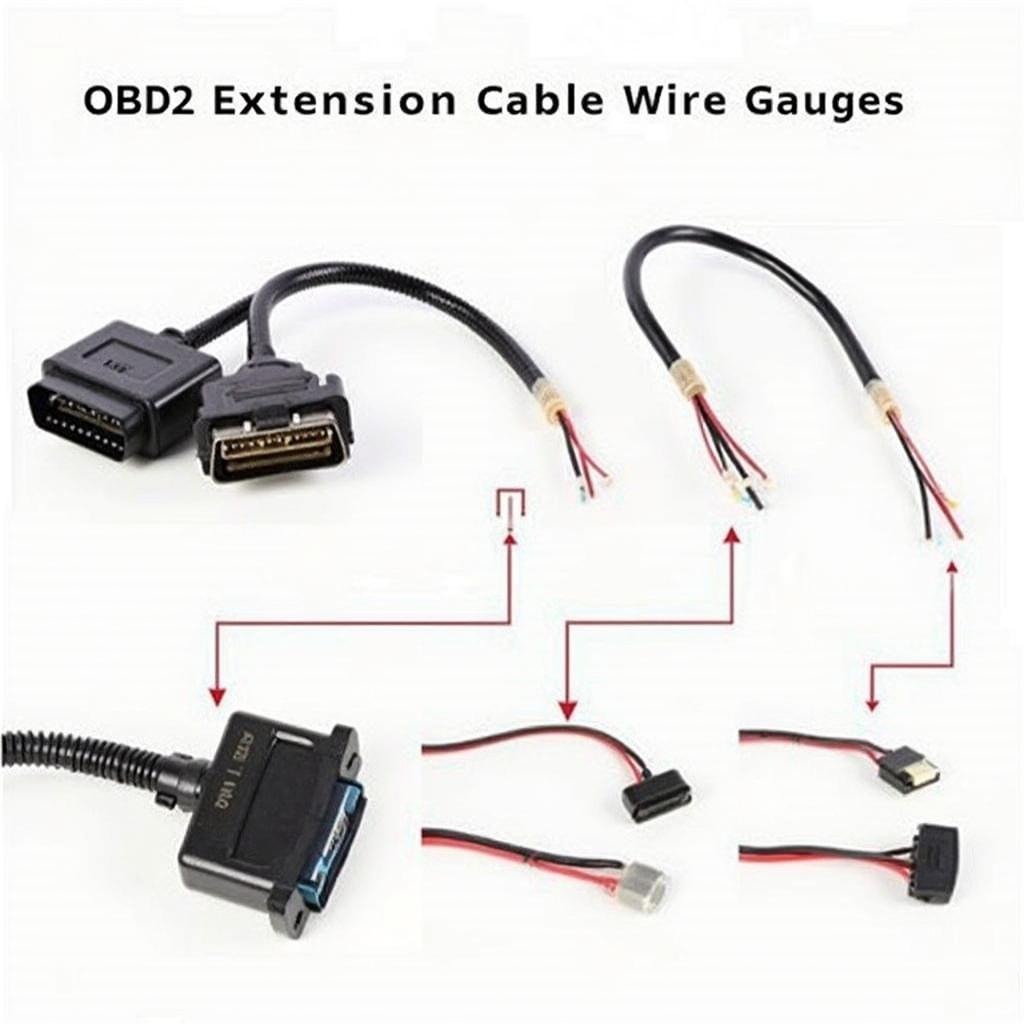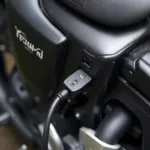Understanding the correct gauge wire for your OBD2 extension is crucial for reliable diagnostics. Choosing the wrong gauge can lead to communication errors, slow data transfer, or even damage to your vehicle’s diagnostic system. This article will delve into the specifics of OBD2 extension wire gauge, providing you with the knowledge to make informed decisions and ensure accurate diagnostic readings.
Decoding OBD2 Extension Wire Gauge Requirements
 OBD2 Extension Wire Gauge Explained
OBD2 Extension Wire Gauge Explained
So, what gauge wire should you use for an OBD2 extension? While there isn’t a single universally prescribed gauge, the generally recommended gauge for OBD2 extension cables is 22 AWG (American Wire Gauge). This gauge provides a good balance between signal integrity and flexibility. Using a thinner wire (higher gauge number) can increase resistance and potentially lead to signal degradation, especially over longer distances. Conversely, a thicker wire (lower gauge number) while offering lower resistance, can be less flexible and more difficult to manage.
Why Wire Gauge Matters for OBD2 Extensions
The gauge of the wire directly impacts the resistance in the cable. Higher resistance can impede the flow of data between your OBD2 scanner and the vehicle’s ECU (Engine Control Unit). Think of it like a water hose: a narrow hose (higher gauge wire) restricts water flow (data flow), while a wider hose (lower gauge wire) allows more water (data) to pass through. For reliable and accurate data transmission, a 22 AWG wire typically offers the optimal balance. You can find more helpful information about OBD2 wire gauge by checking our article on obd2 wire extension gauge.
Choosing the Right OBD2 Extension Cable
Beyond gauge, several factors should be considered when selecting an OBD2 extension cable:
- Length: Choose a length that suits your needs, but be aware that longer cables can introduce signal loss. For longer runs, a lower gauge (thicker) wire might be necessary to compensate, but this can make the cable less flexible.
- Shielding: A shielded cable can protect against electromagnetic interference (EMI), ensuring reliable communication.
- Connector Quality: Ensure the connectors are well-made and fit snugly to prevent connection issues.
What if My OBD2 Extension Uses a Different Gauge?
Using a slightly different gauge, like 20 AWG or 24 AWG, may not necessarily cause immediate problems, especially for shorter extensions. However, it’s always best to adhere to the recommended 22 AWG for optimal performance and to avoid potential issues down the line. If you are performing an LS swap and need guidance on OBD2 extension wiring, our article on ls swap what gauge wire obd2 extension provides valuable insights. For information on the OBD2 port itself, see our article on obd2 port pigtail.
Expert Insights
John Miller, Automotive Diagnostics Engineer: “Using the correct wire gauge for your OBD2 extension is essential for maintaining data integrity. 22 AWG is the sweet spot for balancing signal strength and flexibility.”
Sarah Chen, OBD2 Software Developer: “While slight deviations from the recommended gauge might work in some cases, sticking to 22 AWG minimizes the risk of communication errors and ensures optimal performance with your diagnostic tools.”
In conclusion, selecting the right gauge wire for your OBD2 extension is crucial for accurate and reliable vehicle diagnostics. 22 AWG is the recommended standard, providing a balance of performance and flexibility. Considering factors like cable length, shielding, and connector quality will further ensure optimal performance and prevent potential diagnostic headaches. You can learn more about OBD2 cable wiring by referring to our obd2 cable diagram article. Learn more about general OBD2 extension needs in our what gauge wire obd2 extension article.
FAQ:
- What happens if I use a thinner wire for my OBD2 extension?
- Can I use a thicker wire for a longer OBD2 extension?
- What is the importance of shielding in an OBD2 extension cable?
- How do I choose the right length for my OBD2 extension cable?
- What are the signs of a faulty OBD2 extension cable?
- Where can I find reliable OBD2 extension cables?
- How do I troubleshoot communication errors with my OBD2 scanner and extension cable?
Common Scenarios:
- Scenario 1: User experiences intermittent connection issues with a long OBD2 extension.
- Scenario 2: User receives inaccurate diagnostic readings due to a low-quality OBD2 extension cable.
- Scenario 3: User struggles to reach the OBD2 port with a short extension cable.
Further Reading:
- OBD2 Connector Pinout
- Troubleshooting OBD2 Communication Errors
- Choosing the Right OBD2 Scanner
Need assistance? Contact us via WhatsApp: +1(641)206-8880, Email: [email protected] or visit us at 789 Elm Street, San Francisco, CA 94102, USA. Our customer service team is available 24/7.
